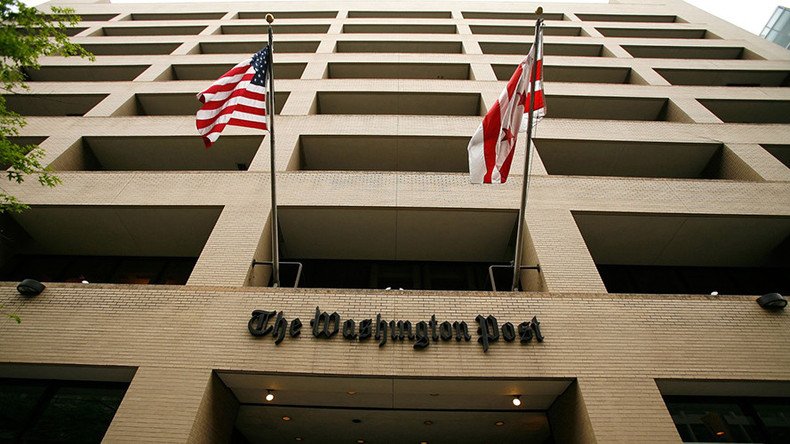The Washington Post: America's #1 source of mass hysteria

The most widely circulated publication in Washington DC, a weapon of mass distribution, has sparked a political firestorm with an unsubstantiated report leveled against - any guesses? - President Donald Trump and his supposed bromance with Putin's Russia.
Dear reader, if that opening summary gives you a sense of déjà vu, you're not alone. We’ve been down this dark road before; it’s not a bad dream. It's just The Washington Post’s latest addition to the steaming compost pile, featuring lies, fabrication and fake news aimed at protecting the Swamp monsters at all cost.
"President Trump revealed highly classified information to the Russian foreign minister and ambassador in a White House meeting last week, according to current and former U.S. officials, who said Trump’s disclosures jeopardized a critical source of intelligence on the Islamic State," the Bezos-owned Post reported, and bereft of any verifiable sources.
Thus was launched the latest salvo in The Post’s non-stop fake news campaign, apparently to compromise the 45th President of the United States to such a degree that calls for his impeachment will be a foregone conclusion (Incidentally, The Post, judging by a Trump hit-piece that appeared just one day before the latest bombshell, seems to be at the forefront of that movement).
The Post article in question was polluted with subjective comments sprinkled with some half-baked truths: "For almost anyone in government, discussing such matters with an adversary would be illegal. As president, Trump has broad authority to declassify government secrets, making it unlikely that his disclosures broke the law."
First, some fact-checking. Russia is only an "adversary" of the United States to the degree the American media proclaims it to be. After all, Russia has taken upon itself the unenviable task of routing Islamic State in Syria, and with stunning success. Major Syrian cities, like Palmyra and Aleppo, have been liberated from the terrorist yoke. And let's not forget that before Russia appeared on the scene, ISIS somehow found the time to run a profitable oil-export business through a loophole on the Turkish border. What next? ISIS issuing IPOs on Wall Street? Russia put an end to that startup venture in short order. All things considered, one would think Washington would be seeking more "enemies" like Russia, which seems to be Trump’s rationale.
Concerning allegations that Trump somehow was wrong to share intelligence with Russia that involved Islamic State, even The Post admitted that "Trump has broad authority to declassify government secrets." Yet, several lines later, it performed a perfect flip-flop into the shallow end, saying: "At a more fundamental level, the information wasn’t the United States’ to provide to others."
Then, to conceal its tracks into the jungle of fake news, The Post was forced to ratchet up the intrigue, alleging that "the partner" who had provided the intelligence (the identity of the "partner" - like so much in this story - remains a source of speculation) "had not given the United States permission to share the material with Russia." Really? Let's be honest. Would any other US Commander-in-Chief aside from Donald J. Trump be blamed for not sitting on smoking intelligence if it meant thwarting an ISIS attack? Probably not. So why the double-standards when it comes to The Donald?
There is another serious matter here that few are mentioning, and that is the identity of these serial leakers. As Trump could be practically heard screaming over Twitter, where is the investigation into these high-level loud mouths? More importantly, why is the media not using more discretion when quoting such sources? Which leads us to the real question: are these “leaks” in reality nothing more than fake news dressed up like bonafide facts?
I have been asking Director Comey & others, from the beginning of my administration, to find the LEAKERS in the intelligence community.....
— Donald J. Trump (@realDonaldTrump) May 16, 2017
Whatever the case may be, the US mainstream media in general and The Washington Post, in particular, are ramping up domestic tensions to levels rarely seen before. The stakes are high. The reason is because Trump refuses to do the bidding of the Deep State, not to mention the 'media industrial complex, which is hell-bent on war in Syria. Proof of that assertion was readily available when Trump bombed a desolate Syrian airfield in early April.
Establishment cheerleader Fareed Zakaria led the round-table rabble when he gleefully gushed, “I think Donald Trump became President of the United States” following the Syrian fireworks display. Really, Fareed? All it took was that little rusty hook - the promise of another US military invasion - to drag you over to Team Trump? Now that Trump is showing a willingness to cooperate with Russia, thereby dashing the fantasies of those media warmongers who - like MSNBC anchor Brian Williams getting all misty-eyed at the "beauty of our weapons" - must start reviling him all over again.
History of Fakery
Since 2013, when the Graham family sold the newspaper to Amazon.com founder Jeff Bezos for $250 million in cash, the publication has morphed into some sort of political parody knockoff of the National Enquirer. It's new motto, "Democracy Dies in Darkness," emblazoned below its title, seems to serve more like a funeral epitaph than any guiding principle that it dutifully follows.
Albert Einstein famously defined insanity as "doing the same thing over and over again and expecting different results." If so, then a lot of readers of The Washington Post must be insane, unless they are not expecting a different result, which would be fact-based reporting without some political ax to grind. In that case, regular readers of The Post who don't expect different results are not necessarily clinically insane, but rather happily delusional.
Since the public has a rather notorious short memory when it comes to news, here’s a quick trip down the Memory Road of WaPo Fake News.
1. Comey goes Begging?
After Donald Trump fired FBI Director James Comey, The Washington Post reported Comey had just sought more funds from the Justice Department to investigate Trump’s alleged ties to the Russians.
However, apparently, The Post never bothered to ring up the Department of Justice, because as it turned out Comey never requested more funds.
2. DOJ hissy fit?
The Post, quoting a “person close to the White House (perchance a lost tourist?),” reported that Deputy Attorney General Rod J. Rosenstein, the man to whom Comey reported, threatened to resign following the decision to fire Comey.
Yet here we have a video of Rosenstein himself denying that he had considered resigning.
Deputy AG #Rosenstein says he didn't threaten to quit over #Comey#FBI firing https://t.co/s4ODR9Qkme@MichelleMacTV@LeandraB_sbgpic.twitter.com/x4U3pjJePo
— Liz McKernan (@LizMcKernan) May 11, 2017
3. Spicer in the bushes?
Following news of Comey's firing, The Post, apparently in some lame effort to sound like a Saturday Night Live episode, reported that Sean Spicer, the White House spokesman, was "hidden in the darkness and among the bushes" trying to avoid reporters.
When that was proven to be yet another steaming pile of horse manure, The Post was forced to add this note to the fake story
EDITOR’S NOTE:This story has been updated to more precisely describe White House Press Secretary Sean Spicer’s location late Tuesday night in the minutes before he briefed reporters. Spicer huddled with his staff among bushes near television sets on the White House grounds, not “in the bushes,” as the story originally stated.
4. Russians turned off the lights?
And then there was the time The Post reported that a “Russian operation” was responsible for hacking into the state of Vermont’s power grid? The story is still sitting there, in fact, carrying the same scaremongering headline, positioned over yet another Editor’s Note divesting Russian hackers of any blame:
Editor’s Note: "An earlier version of this story incorrectly said that Russian hackers had penetrated the US electric grid. Authorities say there is no indication of that so far. The computer at Burlington Electric that was hacked was not attached to the grid."
5. The Post decides what's fake
Finally, the mother of all ironies. The Post’s crown gem of all fake news was essentially a fake news story blaming Russia – and a host of alternative websites – for spreading fake news. I kid you not. In fact, much of the unfounded hysteria over “Russia hacking American democracy” resulted from a now debunked Post article that used material from a group called PropOrNot, which, despite proclaiming to gauge the media on behalf of the public, shuns the public spotlight, preferring anonymity. The Post article by one Craig Timberg alleged “a sophisticated Russian propaganda campaign that created and spread misleading articles online with the goal of punishing Democrat Hillary Clinton, helping Republican Donald Trump and undermining faith in American democracy...”
PropOrNot issued a report identifying more than 200 websites that, in its opinion, "echoed" Russian propaganda.
So next we'll be banning echos, I guess.
*WaPo's Editorial Note that accompanies the above-mentioned 'scoop' is so lengthy I must, regrettably, refer the reader to The Washington Post to read it online.
Meanwhile, it is worth noting that The Post’s latest bit of insanity against Trump and Russia comes at a time when an ongoing investigation into the murder of Seth Rich, the Democratic National Committee staffer who was gunned down on July 10 on a Washington, DC street, has taken a very interesting and disturbing turn.
Rod Wheeler, a retired Washington homicide detective and Fox News contributor, said his efforts are pointing to Rich having made contact with WikiLeaks before his untimely death.
Reward for the killers of Seth Rich is now $130,000 https://t.co/KAiNFJusIb
— WikiLeaks (@wikileaks) January 19, 2017
Why is this important? Because of all the possible suspects to have leaked DNC emails to WikiLeaks, thus possibly sidetracking Hillary Clinton's hopes for the White House, it seems that Mr. Rich, who was the Voter Expansion Data Director at the DNC, was far ahead of Russia on that score.
Yet US media scoffed at any attempt to make a connection between Mr. Rich and the DNC leaks, even after WikiLeaks decided in August to issue a US $20k reward for information leading to conviction for the murder of the young staffer. It's important to note that WikiLeaks never said Rich was the source of the leaked emails. And Washington metropolitan police reported his killing was related to a robbery gone awry.
Nevertheless, Wheeler's recent comments are raising some eyebrows. In fact, The Washington Post would have performed much more of a public service by examining this story rather than seeing a Russian behind every tree.
“My investigation up to this point shows there was some degree of email exchange between Seth Rich and WikiLeaks,” Wheeler said. “I do believe that the answers to who murdered Seth Rich sits on his computer on a shelf at the DC police or FBI headquarters.”
Coincidence or not, The Washington Post story on Trump allegedly passing intelligence to the Russians was published less than an hour after the Seth Rich story broke.
Note: On May 16, a story - that this article cited - was posted on the Fox News website on the investigation into the 2016 murder of DNC Staffer Seth Rich. It reported, based on the findings of a private investigator, that Mr. Rich may have had contact with WikiLeaks. Fox News has since retracted the article.
The statements, views and opinions expressed in this column are solely those of the author and do not necessarily represent those of RT.













